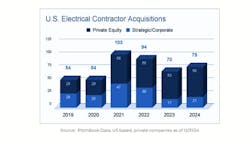The Future of Mergers & Acquisitions for Electrical Contracting Firms
Well-run, stable and advantageously positioned electrical contracting firms are becoming appealing acquisition targets as demand grows for expertise in a field brimming with opportunity.
New analysis of data from 2024 and predictions for 2025 and beyond suggest the industry is in a phase where suitors seeking expansion, consolidation and synergies continue beating a path to its door.
A May whitepaper from FMI Capital Advisors sees the stars aligning for more mergers and acquisitions of ECs because of their central role in infrastructure development and maintenance that increasingly turns on the availability, delivery and utilization of electrical power. Their growing importance is drawing interest from both expansion- and scale enhancement-minded industry participants and investment-hungry private equity firms, resulting in escalating deal price tags that can in turn drive more market activity. ECs share attributes with other companies that convey a message of solid “niche” value to buyers.
“Specialty trade contractors and service providers are prime targets for investors due to their scalability, differentiation, fragmentation and sustainable, long-term growth trends, all of which contribute to attractive risk-return profiles,” the whitepaper states.
The paper says the M&A outlook for ECs in 2025 has grown somewhat clouded due to increased economic uncertainty, but, quoting an FMI executive, the recent past points to deal activity continuing largely unimpeded.
“We have seen a notable uptick in commercial and industrial electrical contractor M&A activity over the past 18 to 24 months, driven by private equity consolidation, data center demands and the increased complexity of electrical systems,” Ryan Foley, an FMI managing director says. “While the current market turbulence may pose supply chain headaches, we don’t expect to see any material effects on deal flow, especially in the middle market.”
In 2024, the paper states, 30 “pure-play” EC acquisitions were closed, along with 10 “private equity-backed platforms pursuing consolidation strategies in the space.” Additionally, FMI says, activity was heavy in the broader mechanical-electrical-plumbing (MEP) space that brought electrical contractors under larger umbrellas designed to consolidate fragmented regional service providers.
Though the overall deal pace has slowed in recent years, it could be poised to pick up. Both reports point to the growing importance of ECs in the specialty contractor world, partly reflected in the M&A valuation premiums they’re commanding. BMI says EC deals have been fetching 15% to 20% more on average than those for other specialty contractors.
Higher valuations are supported by a range of factors, BMI says, including the preponderance of significant recurring revenue work; more upgrade/retrofit work that is valued higher than new construction work; highly diversified, sticky customer bases; generally stable teams of licensed professional electricians; and strong, solid and consistent financials.
Despite more economic uncertainty, both FMI and BMI say the prospects for more M&A deals in the EC space are good. More large contractors and private equity platforms are in the hunt for deals as are more smaller firms whose ownership may be looking for an exit path. Add in a robust demand for what ECs bring to the table in a market that looks solid and stable, and the recipe is in place for more dealmaking.
The FMI report concludes that “fundamental shifts in U.S. policy have drastically impacted the investment landscape, but long-term trends in electrification and connectivity will create significant opportunities for investment in the electrical contracting space. FMI expects incredible growth in electrical M&A once near-term economic conditions begin to improve.”
About the Author
Tom Zind
Freelance Writer
Zind is a freelance writer based in Lee’s Summit, Mo. He can be reached at [email protected].

